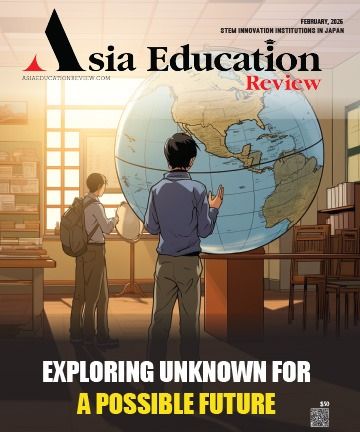Nanyang Technological University: Redefining Research, Innovation, and Sustainability in Asia

Simon Redfern
Dean - Science
Most Asian higher-learning institutions still place greater importance on teaching compared to research, with fewer breakthrough scientific contributions and less global recognition. The graduates find it difficult to fit the fast-changing needs of industries such as technology, sustainability, and healthcare.
At the same time, pressure mounts for universities to integrate sustainability and climate responsibility into their academic programs as well as campus buildings. In order to ensure global competitiveness, institutions should adopt cross-disciplinary research, up-to-date infrastructure, and global learning environments many are still lacking in these areas. Against such a background is Nanyang Technological University, Singapore (NTU), which shines.
A public research university, it houses a diverse community of approximately 35,000 postgraduates and undergraduates on the Business, Computing & Data Science, Engineering, Humanities, Arts & Social Sciences, Medicine, Science, and Graduate Colleges campuses.
It also consists of flagship autonomous institutes like the National Institute of Education, S. Rajaratnam School of International Studies, and the Singapore Centre for Environmental Life Sciences Engineering. NTU boasts top research centres such as the Earth Observatory of Singapore, Nanyang Environment & Water Research Institute, and the Energy Research Institute.
This holistic arrangement allows it to provide holistic, world-class training while also promoting innovation and sustainability. Through its Smart Campus initiative, it utilizes digital technologies to improve learning, living, research, and ecological sustainability across campus.
From Roots to Reach its Founding, Scope & Offerings
Founded in 1981 as the Nanyang Technological Institute and upgraded to university status in 1991, Nanyang Technological University's birth was motivated by Singapore's vision of developing regional capability in engineering and technology. It has since grown into a fully-fledged research-intensive global university. Currently, it occupies a vast 200-hectare main campus, the biggest in Singapore, as well as a medical campus in Novena.
Its academic environment consists of several schools and colleges, including the College of Engineering, College of Science, Nanyang Business School, Lee Kong Chian School of Medicine, College of Humanities, Arts & Social Sciences, College of Computing & Data Science, Graduate College, NIE, and S. Rajaratnam School of International Studies.
Its 8000 or so faculty members are from over 70 nations, creating diversity and internationalism. Its state-of-the-art facilities, like The Hive, The Arc, The Wave, and symbolic natural landmarks like Yunnan Garden, are expressions of its devotion to blending human ingenuity with natural beauty.
Nanyang Technological University provides a range of disciplinary programs from undergraduate majors to research postgraduate degrees enriched by cross-disciplinary, experiential, and entrepreneurial modules. The campus hums with possibilities: collaborative internships, field studies, make-and-tinker labs, and innovation spaces that inculcate entrepreneurship into the curriculum.
Leading-Edge Research & Innovation in Action
Nanyang Technological University's cross-disciplinary research strengths continue to make international headlines, a testament to the institution as a science and innovation pioneer. One such eye-catching example is the recent success for its materials scientists who created the world's first sunscreen made from pollen from Camellia flowers.
The achievement offers protection that is as good as commercial sunscreens made with titanium dioxide or zinc oxide but is sustainable and coral-friendly. By combining environmental awareness and advanced science, it illustrates how research can produce real-world outcomes for both individuals and the environment. “Nanyang Technological University's spirit of collaboration opened doors I never thought my research would now shape policy outside the lab”, says Dr Jasmine Tan, Environmental Researcher.
At Nanyang Technological University, we learn not just to discover knowledge but to apply it for a better tomorrow
These advances are underpinned by its robust research infrastructure, led by leading institutes such as the Earth Observatory of Singapore, Nanyang Environment & Water Research Institute, and Energy Research Institute at Nanyang Technological University, Singapore.
Collectively, they drive integrated solutions to pressing global issues in sustainability, climate resilience, and energy transformation. Beyond the pursuit of scientific breakthroughs, it proactively fosters next-generation innovation leaders through its Innovation & Entrepreneurship (NTU I&E) ecosystem.
Institutions like the NTU Entrepreneurship Academy and NTUitive offer training, mentorship, incubation, and financing. This guarantees that high-quality research is converted into startups, technologies, and policies that create a significant difference in industry and society.
Future Vision
Nanyang Technological University will continue to promote comprehensive student development within a dynamic and welcoming campus environment with varied housing, facilities, and inclusive programmes that promote well-being, leadership, and community participation.
“Living on that green campus transformed my approach to innovation and sustainability it remains central to my leadership today”, says Alan Ng, Social Entrepreneurship Fellow. Future plans see it expanding its global research presence, intensifying sustainability embedding, and developing innovation-driven education.
Through the strengthening of academic-industry connections, development of smart campus technologies, and growth of interdisciplinary collaborations, it is well-positioned to develop future-ready leaders and provide innovative solutions for regional and international environmental, technological, and social issues.
🍪 Do you like Cookies?
We use cookies to ensure you get the best experience on our website. Read more...





